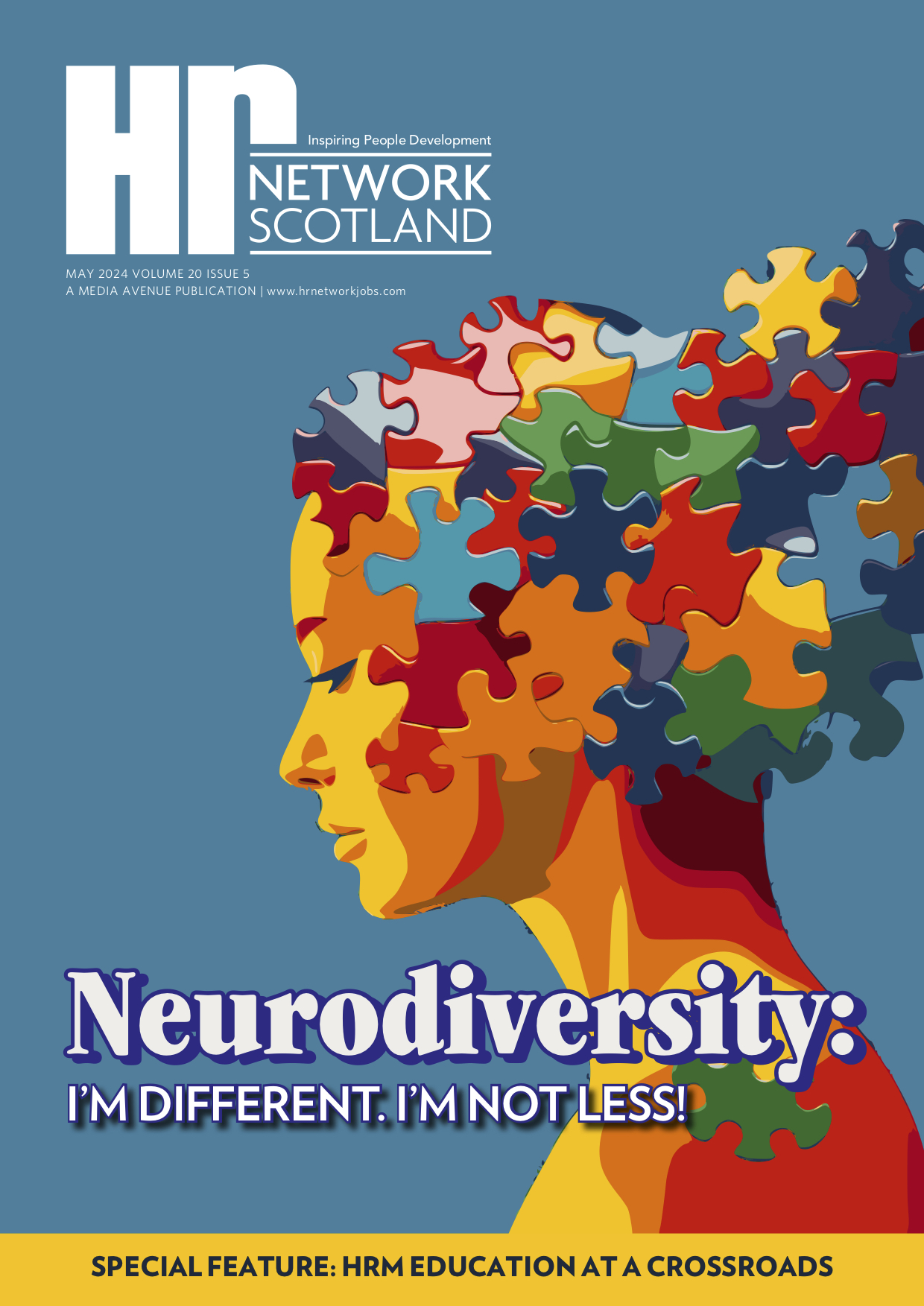Our Latest News
Stop dismissing flexible working and look at the evidence, business leaders are told
Stop dismissing flexible working and look at the evidence, business leaders are told
 The majority of Scottish employers and workers think flexible working is good for business and for people. But more than four in ten (43%) business leaders and senior managers say greater flex is being held back because of opposition from their own peers and senior colleagues, prompting calls for ‘doubting’ business leaders to stop dismissing flex and look at the evidence.
The majority of Scottish employers and workers think flexible working is good for business and for people. But more than four in ten (43%) business leaders and senior managers say greater flex is being held back because of opposition from their own peers and senior colleagues, prompting calls for ‘doubting’ business leaders to stop dismissing flex and look at the evidence.
New research published by social business Flexibility Works in a report called Flex for Life 2024 shows 71% of Scottish employers think flexible working is positive for their organisation, and 85% of Scottish workers either already work flexibly or would like to do so.
The figures, based on polling data from 262 Scottish business leaders and senior managers as well as 1,016 Scottish workers, are the latest in a growing body of evidence (2) about the positive impact of flexible working, which Flexibility Works says business leaders should take seriously.
According to the new data, flexible working continues to rise in Scotland with 67% of workers saying they work flexibly, up from 61% last year, and 46% pre-pandemic. The data shows Scottish employers recognise many business benefits from offering flexible working.
This includes that flex has:
- 75% – helped us retain good staff
- 71% – reduced staff sickness and absence
- 66% – encouraged staff to above and beyond their role
- 64% – enabled them to increase overall business productivity
- 64% – reduced costs to the business
- 60% – increased the quality and quantity of candidates during recruitment
The research includes comparative responses from flexible workers (people who currently work flexibly) and workers without flexibility that demonstrates clear business benefits from offering flex. Flexible workers consistently responded more positively than workers without flex to a range of statements, including:
- I’m happy with my work life balance (77% of flexible workers, 47% of workers without flex)
- I would like to stay with my employer (73% of flexible workers, 58% of workers without flex)
- I feel calm and focused at work (69% of flexible workers, 46% of workers without flex)
- I would recommend my employer (65% of flexible workers, 42% of workers without flex)
Nikki Slowey, co-founder and director of Flexibility Works, said: “Our figures show a strong consensus among employers and workers that flexible working is good for business and for people. And we’re not alone in this finding. The business case for flex is well established with multiple, large-scale UK and international studies showing it makes good business sense to offer flexible working.
“The problem is that some business leaders, who are often highly successful and powerful, are still not willing to look beyond their own preferred ways of working, or the way things have always been done.
“It’s absolutely right to scrutinise flexible working. But the case for flex is stronger than ever and we believe some flexible working is possible in almost every role. We’re urging business leaders who still have doubts about flex to look at the evidence inside and outside their organisation before making decisions on how people work, rather than relying on personal preferences and tradition.”
The Scottish Government supported the research. Gillian Martin, Fair Work Minister, said: “Flexible working is here to stay. This year’s Flex for Life research shows the demand for flexible working has not waned among workers, and that many employers recognise the business benefits it can bring.
“In the absence of powers over employment law, the Scottish Government is determined to use the levers at our disposal to promote fair work practices – of which flexible working is key – across Scotland’s labour market. All employers, public and private, should take on board these findings and look to improve their flexible working offer. This can help to attract and retain workers with under-utilised skills and experience and help those on low incomes access the labour market.”
Catherine McWilliam, Nations Director for the Institute of Directors in Scotland, which represents more than 1,000 Scottish cross-sector industry leaders, said: “Many of today’s key business challenges, such as how to increase productivity or deal with staff shortages can be addressed, at least in part, through greater flexible working. It’s not about handing complete control to staff. It’s about finding mutually beneficial and better ways of working for everyone. We encourage our members to look at the evidence around flexible working, and explore greater flex within their own organisation.”
Flexibility Works’ Flex for Life 2024 report includes a guide for employers on how to get flexible working right, including the importance of having senior managers on board and advice on how to influence them. The research is Scotland’s most comprehensive analysis of flexible working, and is published annually. It shows 85% of workers and 91% of employers expect flexible working in their organisation to stay the same or increase over the next 12 months.
The Great Potential: Nearly half of UK employees want to change their career
The Great Potential: Nearly half of UK employees want to change their career
LHH, a leading integrated talent solutions provider and global business unit of the Adecco Group, today releases the UK findings from its the annual global study: Global Workforce of the Future Report 2024. Now in its fourth year, the Global Workforce of the Future research investigates the changing world of work from the workers’ perspective.
 The global employment landscape has changed tremendously in recent years, with its impact being felt by UK workers. Over half (54%) feel like external factors such as company strategy and performance, and the economy, have more control over their career than they do.
The global employment landscape has changed tremendously in recent years, with its impact being felt by UK workers. Over half (54%) feel like external factors such as company strategy and performance, and the economy, have more control over their career than they do.
Despite this, employees are still proactively planning for the future. Nearly half (49%) want to change their career but don’t know which path to take, with 1 in 5 (20%) spending time weekly considering their career plans.
Retaining top talent is of critical importance for organisations, it helps them to future proof themselves, and lays the platform for stability and growth. It is good news, therefore, that our report found that UK employees are keen to be developed. Over two-thirds (68%) of respondents feel that companies should train, up-skill and/or develop existing employees for different roles across the organisation before hiring external candidates.
The report found that UK employees are also optimistic about up-skilling, with over half (58%) feeling that the prospect of a different or new profession or career inspires them to learn skills outside of their day job. Nearly half (47%) want to move into management but feel that the lack of leadership development holds them back.
JC Townend, CEO, LHH said: “Companies are finding it more and more important to invest in their employees. Their best employees will often be among their most ambitious, and ensuring they have development and support for their advancing career goals will be important to retaining them in the company. In addition, the rapid change in jobs with new technology, regulations, and expanded responsibilities for workers means existing employees need to be re-skilled to continue to do their jobs well. In order to enable UK workers to thrive, we need to ensure that they have opportunities to progress and develop their careers, throughout their careers.”
Among HR leaders, leadership development is also a big priority. LHH’s ICEO 2024 research found that HR senior leaders in the UK are investing in leaders with 69% stating their organisation has a formal executive development programme in place. There are still barriers however, with 1 in 5 (20%) seeing underrepresentation of women and other diverse groups in the executive ranks as a challenge within their organisation’s senior executive ranks. That said, 36% feel like they have the necessary support to overcome the current challenges of leadership.
OUT TODAY – MAY 2024 Issue of Hr NETWORK Magazine
OUT TODAY – May 2024 Issue of Hr NETWORK Magazine
Hr NETWORK is ‘The Hub’ of Scottish HR and people development with an ‘Access All Areas’ pass to Scotland’s most influential human resource and business professionals across all sectors in Scotland. As well as readers from the world of HR, the magazine is also extremely popular within SME (Small and Medium Enterprise) organisations and is very useful for line managers, heads of department, senior management, managing directors and other professionals throughout the country who play a vital role in the development of people within all industry sectors in Scotland. Published bi-monthly, Hr NETWORK Magazine is informative and a ‘must have’ for its readers, and brings with it in every issue, great opportunities and benefits for advertisers and sponsors too.
Hr NETWORK Magazine May 2024
Neurodiversity: I’m different. I’m not less!
Fresh perspectives, analytic thinking and exceptional cognitive skills are among the many attributes of neurodivergent people – those that probably include you and me. Andy Moore discovers how HR can maximise neurodiversity in the workplace.
Also in the latest issue:
- The regular sections of the magazine include: Stats, EXTRA and The Bookshop
- The ‘Insights’ section features first class comment from those in the know on a range of subjects including: Bereavement in the Workplace, Bias in Recruitment
FINAL DELEGATE BOOKINGS: Last chance to book your delegate place at #hrnc24
Hr NETWORK ‘FUTURE LEADERS’ Conference & Exhibition 2024

The Hr NETWORK National Conference & Exhibition will take place on Thursday 9th May 2024 at the home of Scottish Rugby, the magnificent Murrayfield Stadium.
Full speaker information is available on the Conference & Exhibition page our website.
The delegate booking form for 2024 will CLOSE at 5PM on Friday 3rd May and this is your last chance to book your place.
Large businesses floundering to tackle cyber threats
Large businesses floundering to tackle cyber threats
Large businesses find it significantly more difficult to manage their cyber security than their smaller counterparts, new research from IDEE has revealed. The cyber security firm commissioned an independent survey of more than 500 IT and cyber security professionals within UK businesses. It found that 74% of respondents from large businesses (more than 500 employees) believe it has become far more challenging to defend against cyber attacks since the Covid-induced rise of remote and hybrid working – only 50% of respondents from small businesses (less than 50 employees) said the same thing.
 Just 36% of small businesses said that a lack of skills and knowledge is a major cyber security challenge. In comparison, this figure rose to 68% among large businesses. Meanwhile, 54% of large businesses said they need to simplify their cyber security solutions so that staff can properly engage with them, but this figure drops to 36% among small businesses. Further, while 74% of large businesses said human error is the greatest threat to their cyber security, only 41% of small businesses agreed with that same statement.
Just 36% of small businesses said that a lack of skills and knowledge is a major cyber security challenge. In comparison, this figure rose to 68% among large businesses. Meanwhile, 54% of large businesses said they need to simplify their cyber security solutions so that staff can properly engage with them, but this figure drops to 36% among small businesses. Further, while 74% of large businesses said human error is the greatest threat to their cyber security, only 41% of small businesses agreed with that same statement.
However, while evidently struggling more to protect their IT systems, large businesses were found to be far more aware of the risks they are facing and the implications of them. For instance, 92% of respondents from large businesses said they understand the financial costs that are associated with a cyber breach, compared to 73% of respondents from small businesses. The survey also found that 32% of respondents from small businesses are unaware of the reputational cost of a cyber attack, but only half as many (16%) respondents from large organisations were similarly unaware.
Al Lakhani, CEO of IDEE, said: “The lyrics ‘mo money, mo problems’ spring to mind when looking through these statistics. On the one hand, cyber security professionals in large businesses clearly have a better grasp on the cyber threats they face and the damage that can be done, but they still struggle much, much more to defend against them.
“More employees, more systems, larger supply chains, reliance on legacy IT – there are numerous reasons why cyber security becomes more challenging the bigger a business gets. But recent headlines of breaches involving the Bank of America breach underline that enterprises are also a victim of their own outdated, backward approach to cyber security.
“Account takeover is only possible in three ways – credentials compromise, vulnerabilities, and backdoors. Shockingly, more than 80% of attacks occur due to credentials compromise. But too many blue chips still rely on detection methods that have consistently fallen short in foiling account takeover attacks, rather than embracing preventative solutions. So, I hope that now marks the turning point in eliminating credentials-based attacks and that, as an industry, we turn to a digitally secure future built on transitive trust and identity proofing.”
Equality watchdog advises employers on updated pregnancy and maternity protections in the workplace
Equality watchdog advises employers on updated pregnancy and maternity protections in the workplace
 The Equality and Human Rights Commission (EHRC) today published an updated toolkit to provide employers with clear advice on what they should do to prevent pregnancy and maternity discrimination at work. This updated guidance reflects changes to the law which have come into effect this month (April 2024). The toolkit gives detailed guidance on what action employers must take before, during and after their staff take maternity leave, to ensure they are protected from discrimination.
The Equality and Human Rights Commission (EHRC) today published an updated toolkit to provide employers with clear advice on what they should do to prevent pregnancy and maternity discrimination at work. This updated guidance reflects changes to the law which have come into effect this month (April 2024). The toolkit gives detailed guidance on what action employers must take before, during and after their staff take maternity leave, to ensure they are protected from discrimination.
The toolkit sets out the changes employers will have to make, which include:
- Extending protection from redundancy to include pregnant women and those on maternity, adoption and shared parental leave
- Offering suitable alternative employment to pregnant women and those on maternity, adoption and shared parental leave in a redundancy situation, including having priority over other employees regarding alternative roles
- Providing the right to request flexible working from the first day of employment
- Increasing flexibility in how paternity leave can be taken. All employers should review the advice and ensure their policies are fully compliant with the law, so pregnant staff, and staff taking parental leave, receive the full protections they are entitled to
Baroness Kishwer Falkner, Chairwoman of the Equality and Human Rights Commission said: “As Britain’s equality watchdog, we have a duty to explain the law around pregnancy and maternity rights to employers, employees and the public. “An employer understanding their legal duties is the foundation of equality in the workplace. Our revised toolkit explains those legal obligations and provides employers with practical advice on how they can best support pregnant women at work and ensure those staff taking parental leave are not discriminated against.”










